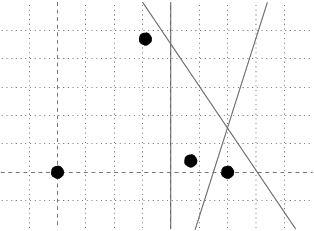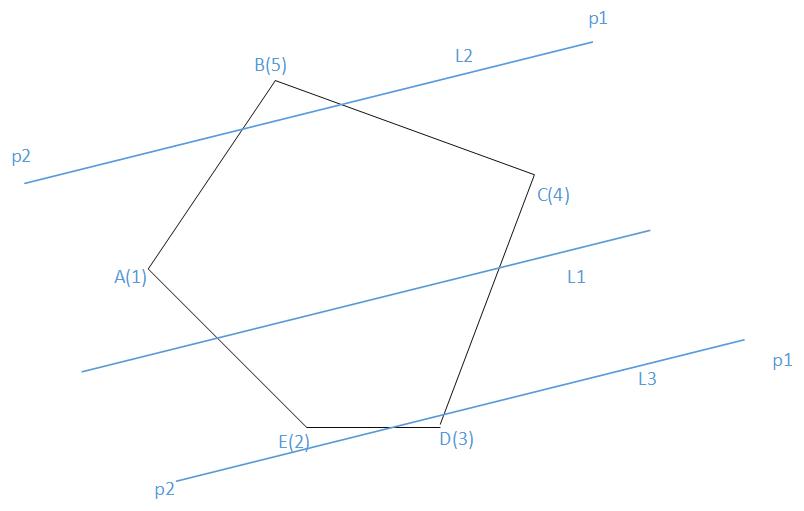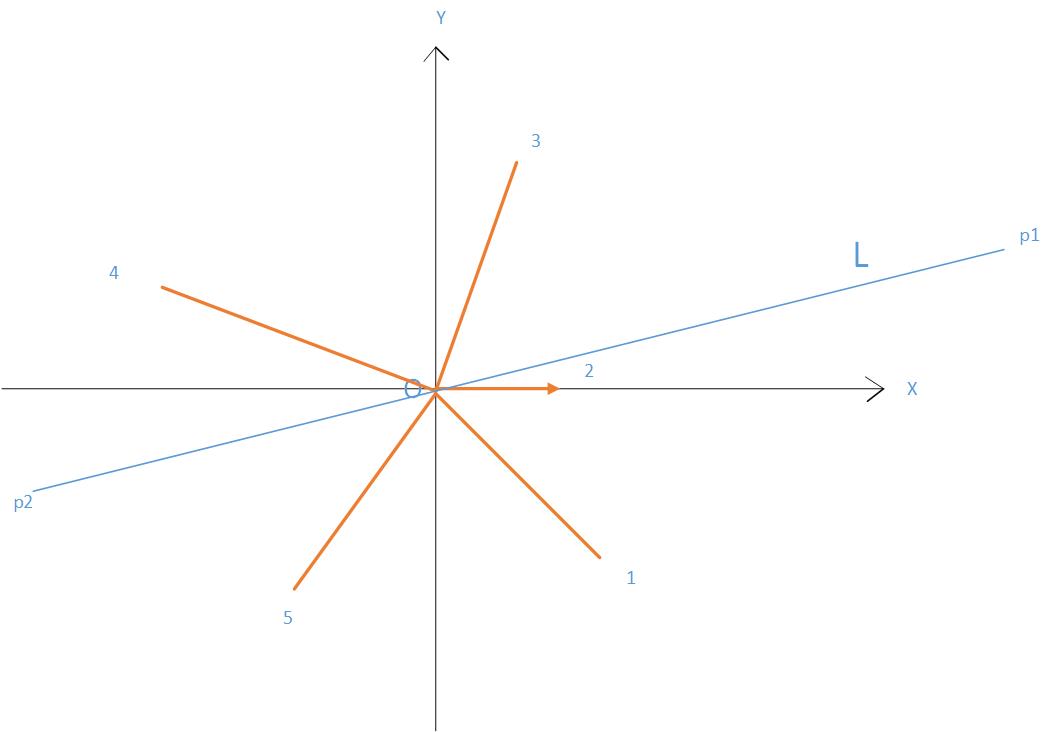poj 1912 A highway and the seven dwarfs
Posted ZefengYao
tags:
篇首语:本文由小常识网(cha138.com)小编为大家整理,主要介绍了poj 1912 A highway and the seven dwarfs相关的知识,希望对你有一定的参考价值。
| Time Limit: 8000MS | Memory Limit: 30000K | |
| Total Submissions: 2622 | Accepted: 535 | |
| Case Time Limit: 3000MS | ||
Description
Once, the humans living in countries around Dwarfland decided to build several straight highways. As the humans weren\'t aware of the dwarfs, some of the planned highways passed through Dwarfland. The dwarfs discovered this and were quite unhappy about it. The dwarfs are very little, and also very slow, so they are unable to cross the highway safely.
The dwarfs managed to get the plans for the highways somehow, and now they need your help. They would like to keep on visiting each other, so they don\'t like those highways which divide their houses into two non-empty parts. After they find out which highways they don\'t like, they will magically prevent the humans from building them.
The dwarfs are very little, and cannot reach the keyboard. So they asked for your help.
Task
Given is a number N of points (houses) in the plane and several straight lines (highways). For each given line, your task is to determine whether all N points lie on the same side of the line or not. Your program has to output the answer for the currently processed line before reading the description of the next one. You may assume that no highway passes through any of the houses.
Input
Each of the following lines contains four real numbers X1, Y1, X2, Y2 ( -109 < = X1, Y1, X2, Y2 < = 109) separated by a single space. These numbers are the coordinates of two different points [X1, Y1] and [X2, Y2], lying on the highway.
Output
Sample Input
4 0.0 0 6.00 -0.001 3.125 4.747 4.747 0.47 5 3 7 0 4 -4.7 7 4.7 4 47 4 94
Sample Output
GOOD BAD BAD
Hint



第一幅图中,向量AE,ED,DC,CB,BA的极角在 坐标系中变化是单调的,于是把他们都移到图二中来,都以O点为起点,按照极角大小排序并编号,凸包的算法因人而异,我现在用的凸包算法是以最左端的A点开始存储,并按照逆时针方向存储点的,那么AE向量最好标记为极角最小的向量,ED次之,以此类推,那么我们就得设定极角的变化范围为(-90,270],这样将所有的向量排好序,并标记好编号,譬如右图的1向量代表AE向量。。。现在又给出一条直线L1,如何得知L1和凸包相交呢?我们平移L1的向量形式,移到L1只割掉了凸包一个点的位置(一共两个位置),L2的方向为p1p2,L3的方向为p2p1,我们发现这两条向量如果都要逆时针转一个方向,分别转动到向量DC和向量BA的位置需要转动的角度是最小的,而向量DC和BA的端点D,B又恰恰是向量L3和L1所割掉的点那么如果线段DB和直线L1有交点,则L1一定和凸包存在交点的。这个规律放到图二来看,直线L的向量形式为p2p1,转到向量3是所转角度最小的,其反向的向量转到向量5转角度又是最小的,向量3与向量5都是可以通过二分查找找出来,找到向量之后在取其起始端点,判断这两个起始端点是否与直线相交。
AC代码:
#define _CRT_SECURE_NO_DEPRECATE #include<iostream> #include<stdio.h> #include<algorithm> #include<queue> #include<set> #include<vector> #include<cstring> #include<string> #include<functional> #include<cmath> #include<stack> using namespace std; const int N_MAX = 100000 + 5; #define INF 0x3f3f3f3f #define EPS 1e-10 #define equals(a,b) (fabs(a-b)<EPS) #define pi acos(-1.0) #define BOTTOM 0 #define LEFT 1 #define RIGHT 2 #define TOP 3 static const int COUNTER_CLOCKWISE = -1; static const int CLOCKWISE = 1; static const int ONLINE_BACK = 2; static const int ONLINE_FRONT = -2; static const int ON_SEGMENT = 0; double add(double a,double b) { if (abs(a + b) < EPS*(abs(a) + abs(b)))return 0; return a + b; } class point { public: double x, y; point(double x = 0, double y = 0) :x(x), y(y) {} point operator +(point p) { return point(x+p.x, y+p.y); } point operator -(point p) { return point(x - p.x,y - p.y); } point operator *(double a) { return point(a*x, a*y); } point operator /(double a) { return point(x / a, y / a); } double norm() { return x*x + y*y; } double abs() { return sqrt(norm()); } bool operator<(const point&p)const { return x != p.x ? x < p.x : y < p.y; } bool operator ==(const point&p)const { return x == p.x && y == p.y; } double dot(point p) { return x*p.x+y*p.y; } double det(point p) { return x*p.y- y*p.x; } }; struct Segment { point p1, p2; Segment(point p1 = point(), point p2 = point()) :p1(p1), p2(p2) {} }; typedef Segment line; typedef vector<point>Polygon; //????????????p0p1?????????p0p2????????¬?????? int ccw(point p0, point p1, point p2) { point a = p1 - p0; point b = p2 - p0; if (a.det(b) > EPS)return COUNTER_CLOCKWISE; if (a.det(b) < -EPS)return CLOCKWISE; if (a.dot(b) < -EPS)return ONLINE_BACK; if (a.norm() >= b.norm())return ON_SEGMENT;//!! return ONLINE_FRONT; } //????????????p1p2???p3p4???????????? bool intersect(point p1, point p2, point p3, point p4) { return (ccw(p1, p2, p3)*ccw(p1, p2, p4) < 0 && ccw(p3, p4, p1)*ccw(p3, p4, p2) < 0);//!!!!!!!!!!!!!!!!!!!!!!!!!!! } inline double normalize(double r) { if (r < -pi / 2.0 + EPS) r += pi * 2; return r; } double arg(const point& p) { return normalize(atan2(p.y, p.x)); } inline bool double_cmp(double a,double b) { return a + EPS < b; } //// typedef vector<point>Polygon; vector<point> convex_hull(point *ps, int N) { sort(ps, ps + N); int k = 0; // 凸包的顶点数 vector<point> qs(N * 2); // 构造中的凸包 // 构造凸包的下侧 for (int i = 0; i < N; ++i) { while (k > 1 && (qs[k - 1] - qs[k - 2]).det(ps[i] - qs[k - 1]) <= 0) --k; qs[k++] = ps[i]; } // 构造凸包的上侧 for (int i = N - 2, t = k; i >= 0; --i) { while (k > t && (qs[k - 1] - qs[k - 2]).det(ps[i] - qs[k - 1]) <= 0) --k; qs[k++] = ps[i]; } qs.resize(k - 1); return qs; } point s[N_MAX]; int n; double a[N_MAX];//记录凸包每条边行成的向量倾斜度 int main() { scanf("%d", &n); for (int i = 0; i < n; i++) { scanf("%lf%lf", &s[i].x, &s[i].y); } int N; Polygon con; if (n > 1) { con=convex_hull(s,n); N = con.size(); con.push_back(con[0]); } for (int i = 0; i <N; i++) { a[i] = arg(con[i + 1] - con[i]); } sort(a, a + N, double_cmp); point p1, p2; while (scanf("%lf%lf%lf%lf",&p1.x,&p1.y,&p2.x,&p2.y)!=EOF) { if (n < 2) { puts("GOOD"); continue; } int i = upper_bound(a, a + N, arg(p2 - p1), double_cmp) - a; int j = upper_bound(a, a + N, arg(p1 - p2), double_cmp) - a; puts((((p2 - p1).det(con[i] - p1) * (p2 - p1).det(con[j] - p1) > -EPS)) ? "GOOD" : "BAD"); } return 0; }
以上是关于poj 1912 A highway and the seven dwarfs的主要内容,如果未能解决你的问题,请参考以下文章
POJ1912 A highway and the seven dwarfs (判断凸包与直线相交 logn)